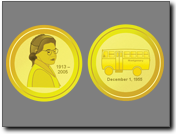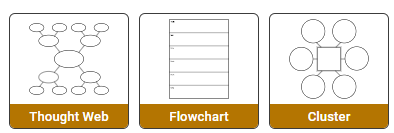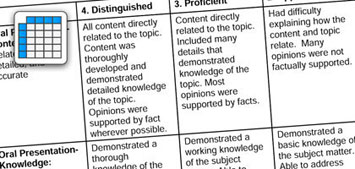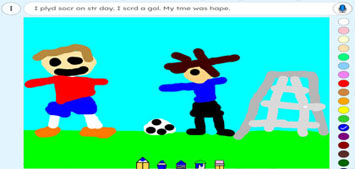
Students will design a new dollar coin that represents the work of a person who impacted history and write persuasively about why this person should be chosen for this honor.
Apps: Wixie®

In 1979 the United States Mint placed Susan B. Anthony on the silver dollar because of her impact on the civil rights movement as well as for being a leading abolitionist. Susan B. Anthony was the first woman to ever be honored with her own coin. However, many other people have had a positive impact on history.
This year, the US Mint has decided to accept applications for yet another person’s portrait on a silver dollar. It is your job to convince the Board of Directors to use your design and to persuade the Directors to choose your selected person.
Start by exploring the impact different people had on history. You could focus their work on the contributions of women for March’s women’s history month. You could also use this project as part of your class’s study of famous Americans, famous Virginians (insert your state or country here), Black History month, or even famous writers.
Based on prior knowledge, or after you have given them a list and time to begin research, have each student should choose the person they want to place on the coin.
Explain that students will also need to craft a persuasive argument for their person and design. When writing persuasively, we try to convince others to agree with our facts, share our values, accept our argument and conclusions, and adopt our way of thinking. A persuasive argument should include:
Once the students have completed their research, have them plan their dollar design. What does a coin usually include? What with they choose to represent their person and accomplishment on the back side of the coin?
Approve each student’s design choices and have them use the paint tools, like those in Wixie, to create a unique design for the front and back of the coin to honor the person they chose and to commemorate the work this person has done.
Have students add pages to their Wixie project and use the information from their research to persuade the US Mint Board of Directors, convincing them that both their person and their coin design should be chosen. Each persuasive presentation should include:

Students should present their persuasive presentations to the rest of the class, community members, and outside experts like graphic designers if you can’t get someone from a US mint to join you.
The Design Your Own Coin project will be assessed on the creativity of the coin design and the quality of the persuasive presentation. During the process, formative assessment can take place, based on 1) the student’s choice of a person to honor, 2) their research on this person, 3) their coin design, 4) their persuasive argument, and 5) their oral presentation.
HBO Home Video. Iron Jawed Angels (2004). Available from Amazon.com.
Stevens, Doris. (1995) Jailed for Freedom: American Women Win the Vote. NewSage Press. ISBN: 0939165252.
Women Change America Gazette. National Women’s History Project
100 Most Influential People of 2006
The Presidential $1 Coin Program
Individual Development and Identity - Personal identity is shaped by one’s culture, by groups, and by institutional influences. Examination of various forms of human behavior enhances understanding of the relationships among social norms and emerging personal identities, the social processes that influence identity formation, and the ethical principles underlying individual action.
Individuals, Groups, and Institutions - Institutions such as schools, churches, families, government agencies, and the courts all play an integral role in our lives. These and other institutions exert enormous influence over us, yet institutions are no more than organizational embodiments to further the core social values of those who comprise them.
Writing Standards
Research to Build and Present Knowledge
7. Conduct short as well as more sustained research projects based on focused questions, demonstrating understanding of the subject under investigation.
Speaking and Listening Standards
Comprehension and Collaboration
2. Integrate and evaluate information presented in diverse media and formats, including visually, quantitatively, and orally.
Presentation of Knowledge and Ideas
4. Present information, findings, and supporting evidence such that listeners can follow the line of reasoning and the organization, development, and style are appropriate to task, purpose, and audience.
3. Knowledge Constructor
Students critically curate a variety of resources using digital tools to construct knowledge, produce creative artifacts and make meaningful learning experiences for themselves and others. Students:
a. plan and employ effective research strategies to locate information and other resources for their intellectual or creative pursuits.
b. evaluate the accuracy, perspective, credibility and relevance of information, media, data or other resources.
c. curate information from digital resources using a variety of tools and methods to create collections of artifacts that demonstrate meaningful connections or conclusions.
6. Creative Communicator
Students communicate clearly and express themselves creatively for a variety of purposes using the platforms, tools, styles, formats and digital media appropriate to their goals. Students:
a. choose the appropriate platforms and tools for meeting the desired objectives of their creation or communication.
b. create original works or responsibly repurpose or remix digital resources into new creations.
d. publish or present content that customizes the message and medium for their intended audiences.

Follow us on Instagram for daily inspiration

Create a thought web, cluster, flowchart, or other graphic organizer for a lesson
Five ideas for creative classroom centers
Creative, digital book reviews
Fun and powerful ideas with animated characters

Wixie
Share your ideas, imagination, and understanding through writing, art, voice, and video.

Rubric Maker
Create custom rubrics for your classroom.

Pics4Learning
A curated, copyright-friendly image library that is safe and free for education.

Wriddle
Write, record, and illustrate a sentence.

Get creative classroom ideas delivered straight to your inbox once a month.
Topics